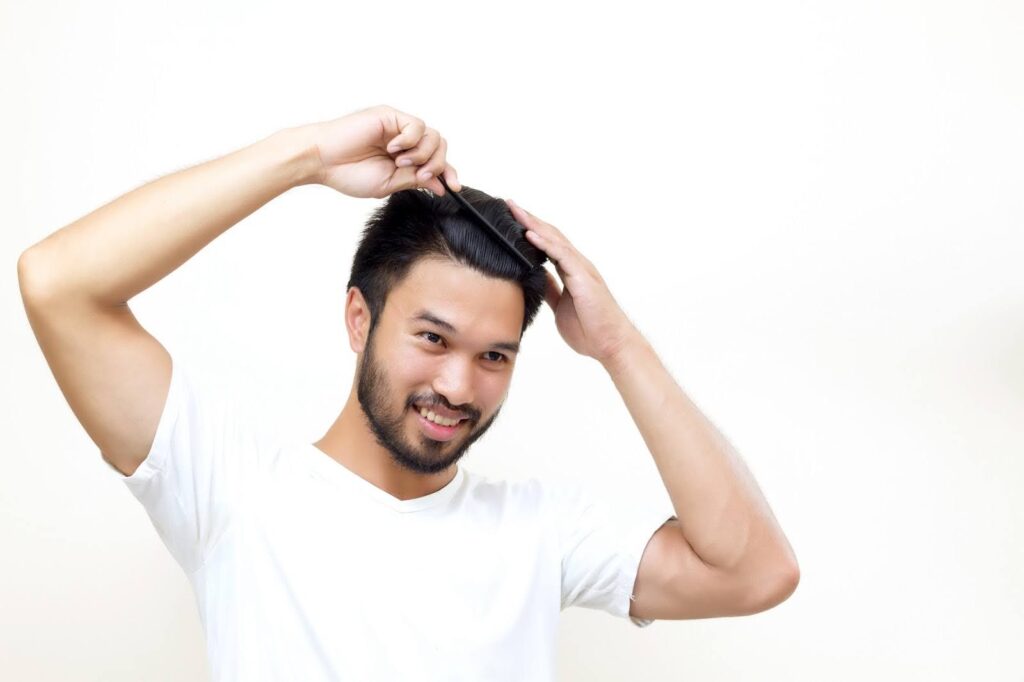Hair loss can be a frustrating experience. You’re not alone if you’ve experienced that unwanted moment looking in the mirror and wondering, “Why did my hair stop growing?” At Nashville Hair Doctor, we understand hair loss’s impact on your confidence and self-esteem. We specialize in the innovative and FDA-approved follicular unit extraction (FUE) hair transplant procedure. Our free quote allows our hair experts to identify your needs and provide feedback on how we can help you. If you’re seeking a reliable solution to hair loss, read on to discover the causes of hair loss and how FUE hair transplants can help.
What Causes Hair Growth and Loss?
If you’re experiencing unwanted hair loss, it’s worth looking at what causes hair to stop growing. Hair goes through three distinct phases: anagen, catagen, and telogen. The anagen phase is the active growth phase, when the hair follicles produce new hair. The catagen phase is transitional, and the telogen phase is the resting phase, where the hair follicles are dormant. After the telogen phase, the hair sheds, and the cycle repeats itself. This hair growth cycle also exists after a hair transplant procedure. Approximately 4-5 days after the NeoGraft® FUE hair transplant, your newly transplanted hair in the recipient area(s) will begin to shed. At Nashville Hair Doctor, our Tennessee-based hair restoration specialists review the thorough post-op plan with you so that this won’t surprise you. But yes, shedding and regrowth are a normal part of the hair cycle, even with transplanted hair. If your hair is not moving through these regular cycles and has completely stopped growing, there could be a few reasons why.
Your Diet and Hair Loss
Your diet plays an integral part in hair health. A lack of essential nutrients, such as vitamins A, C, D, and E, as well as iron, zinc, and protein, can weaken the hair follicles and slow hair growth. Maintaining a balanced diet rich in fruits, vegetables, lean proteins, and whole grains can give your body the nutrients it needs to support healthy hair growth.
Stress Affects Hair Growth
Stress can negatively affect your overall well-being, including your hair. Experiencing high stress levels can lead to a condition known as telogen effluvium, in which many hair follicles simultaneously enter the telogen (resting) phase. This can result in excessive hair shedding and thinning. Managing stress through relaxation techniques, exercise, and a healthy lifestyle can help prevent stress-induced hair loss.
Your Genes Matter
Genetics also plays a significant role in identifying whether hair stops growing. Male pattern baldness is a common form of hair loss influenced by genetic factors. If you have a family history of hair loss, you may be more susceptible to experiencing it yourself. However, hereditary hair loss doesn’t have to define you. You can choose a different option with advancements in hair restoration techniques like FUE hair transplants.
What You Can Do to Maintain Healthy Hair
You can maintain healthy hair even when faced with factors that may contribute to hair loss beyond your control. Take proactive steps to preserve the health of your hair and promote optimal hair growth. Start by following a balanced diet with essential nutrients for hair growth. Providing your body with the necessary vitamins, minerals, and proteins supports your hair’s overall strength and vitality.
It’s also important to avoid excessive heat styling and harsh chemical treatments because these can damage your hair, leading to breakage and hair loss. Minimize heat styling tools and opt for gentler alternatives whenever possible. Choose hair care products free from harsh chemicals and sulfates to maintain the health of your hair. Remember to brush and comb your hair to prevent breakage. Use wide-toothed combs or brushes with soft bristles to minimize tension and avoid pulling on the hair strands. Gentle detangling techniques significantly reduce the risk of hair damage and loss.
It’s not just your skin that needs protection from the sun! You should also regularly shield your hair from the harmful effects of the sun or any environmental pollutants. Wear hats or scarves for extended periods to shield your hair from harmful UV rays when exposed to the sun. Use hair care products that offer protection against environmental pollutants and UV damage.
It’s also helpful to avoid hairstyles that exert excessive tension on the hair follicles, as they can contribute to hair loss. Tight hairstyles like ponytails, braids, or buns strain the hair roots. Opt for looser hairstyles that distribute tension evenly to minimize the risk of hair breakage and loss.
If your hair is losing its luster or beginning to thin, you can also consider natural treatments that may stimulate hair growth. Scalp massages can increase blood flow to the hair follicles, promoting a healthy environment for hair growth. Gently massage your scalp in circular motions using your fingertips.
Certain essential oils, such as rosemary, peppermint, and lavender, have shown the potential to stimulate hair growth. Apply these oils to your scalp to provide nourishment and promote a conducive environment for hair follicle activity. Remember that these natural treatments’ effectiveness may vary from person to person.
While natural treatments can offer some benefits, individuals seeking an effective and long-lasting solution to hair loss may find FUE hair transplants a revolutionary option. Follicular unit extraction (FUE) hair transplants have gained significant popularity due to their effectiveness in addressing hair loss and providing natural-looking results.
FUE Hair Transplants Create Healthy Hair
FUE hair transplants have gained immense popularity recently due to their effectiveness and natural-looking results. This advanced technique removes hair follicles from a specified donor area and transplants them to the area where hair loss is present.
At Nashville Hair Doctor, our skilled technicians carefully extract each hair follicle using specialized equipment, ensuring minimal discomfort and no linear scarring. The harvested follicles are then meticulously implanted into the recipient area, mimicking the natural hair growth pattern. The result is a restored hairline that looks and feels completely natural.
Recovery time after an FUE hair transplant is relatively quick, with most patients able to resume their regular activities within a few days. The transplanted hair will initially shed, but new hair growth typically begins within a few months. Over time, the transplanted hair continues to grow and blend seamlessly with the existing hair, providing a permanent solution to hair loss. The newly transplanted hair will require proper care and maintenance, similar to your natural hair. Our specialists at Nashville Hair Doctor provide comprehensive post-transplant instructions to ensure optimal healing and long-term results. With proper care, your transplanted hair can last a lifetime, giving you the confidence and youthful appearance you desire.
The answer to the question, “What causes hair to completely stop growing?” is multi-faceted. No matter the root cause, however, we at Nashville Hair Doctor, understand the impact of hair loss and offer the cutting-edge FUE hair transplant procedure to address this concern. FUE hair transplants have become a game-changer in hair restoration by addressing the underlying causes of hair loss and providing a reliable and natural-looking solution. With our skilled technicians and state-of-the-art techniques, Nashville Hair Doctor is committed to helping individuals regain their confidence and restore a healthy, full head of hair.
Contact Nashville Hair Doctor today to receive a free quote from our hair restoration center and take the first step toward reclaiming your hair. Visit our website to learn more about our hair and beard transplants, and view our impressive before and after photos to see the remarkable transformations achieved through FUE hair transplants.

